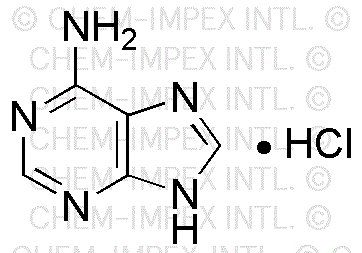Adenine hydrochloride is widely utilized in research focused on:
- Biotechnology: It serves as a key component in the synthesis of nucleotides, which are essential for DNA and RNA production. This is crucial for genetic engineering and synthetic biology applications.
- Pharmaceuticals: Used in the development of antiviral and anticancer drugs, adenine hydrochloride helps in formulating therapies that target specific cellular processes, enhancing treatment efficacy.
- Cell Culture: It is commonly added to cell culture media to promote cell growth and proliferation, particularly in research involving mammalian cells, thereby improving experimental outcomes.
- Diagnostics: The compound plays a role in the development of diagnostic assays, particularly in detecting nucleic acids, which is vital for various medical testing and research applications.
- Research on Metabolism: Adenine hydrochloride is used to study metabolic pathways and energy transfer in cells, providing insights into cellular functions and potential therapeutic targets.
General Information
Properties
Safety and Regulations
Applications
Adenine hydrochloride is widely utilized in research focused on:
- Biotechnology: It serves as a key component in the synthesis of nucleotides, which are essential for DNA and RNA production. This is crucial for genetic engineering and synthetic biology applications.
- Pharmaceuticals: Used in the development of antiviral and anticancer drugs, adenine hydrochloride helps in formulating therapies that target specific cellular processes, enhancing treatment efficacy.
- Cell Culture: It is commonly added to cell culture media to promote cell growth and proliferation, particularly in research involving mammalian cells, thereby improving experimental outcomes.
- Diagnostics: The compound plays a role in the development of diagnostic assays, particularly in detecting nucleic acids, which is vital for various medical testing and research applications.
- Research on Metabolism: Adenine hydrochloride is used to study metabolic pathways and energy transfer in cells, providing insights into cellular functions and potential therapeutic targets.
Documents
Safety Data Sheets (SDS)
The SDS provides comprehensive safety information on handling, storage, and disposal of the product.
Product Specification (PS)
The PS provides a comprehensive breakdown of the product’s properties, including chemical composition, physical state, purity, and storage requirements. It also details acceptable quality ranges and the product's intended applications.
Certificates of Analysis (COA)
Search for Certificates of Analysis (COA) by entering the products Lot Number. Lot and Batch Numbers can be found on a product’s label following the words ‘Lot’ or ‘Batch’.
Numéro de catalogue
Numéro de lot/série
Certificates Of Origin (COO)
This COO confirms the country where the product was manufactured, and also details the materials and components used in it and whether it is derived from natural, synthetic, or other specific sources. This certificate may be required for customs, trade, and regulatory compliance.
Numéro de catalogue
Numéro de lot/série
Safety Data Sheets (SDS)
The SDS provides comprehensive safety information on handling, storage, and disposal of the product.
DownloadProduct Specification (PS)
The PS provides a comprehensive breakdown of the product’s properties, including chemical composition, physical state, purity, and storage requirements. It also details acceptable quality ranges and the product's intended applications.
DownloadCertificates of Analysis (COA)
Search for Certificates of Analysis (COA) by entering the products Lot Number. Lot and Batch Numbers can be found on a product’s label following the words ‘Lot’ or ‘Batch’.
Numéro de catalogue
Numéro de lot/série
Certificates Of Origin (COO)
This COO confirms the country where the product was manufactured, and also details the materials and components used in it and whether it is derived from natural, synthetic, or other specific sources. This certificate may be required for customs, trade, and regulatory compliance.


